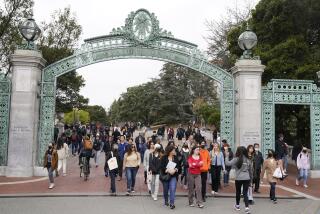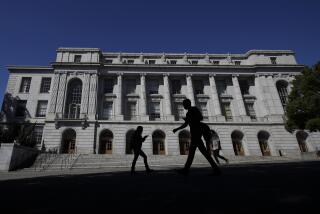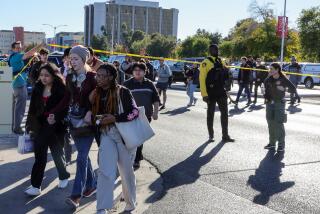USC students not enamored of recent security measures
After four people were shot at a Halloween party on the USC campus last year, university officials reacted swiftly.
They ordered new security measures for the next semester, including restricting access to the campus at night, requiring that late-night visitors preregister and show identification, and mandating that student clubs have more security for many evening events.
Students say that although the new rules may have increased safety, they have also reduced the quality of campus life by making it expensive for clubs to bring speakers and entertainment to campus. Student organizations are now required to pay for the extra security, including temporary fencing.
This year, the student government’s Welcome Back Concert had to spend about $11,000 on security, more than twice last year’s cost, to meet the new requirements, leaving them unsure of how much they can allocate for their bigger spring concert. Last year, the second-semester concert cost about $9,000 more than the 2011 event.
Other groups have either moved events off campus or canceled them outright.
Many students say their programming fees — a mandatory $57.50 paid each semester — shouldn’t be used for security.
“We think that money should be used to bring fun and interesting events to campus,” said Logan Heley, a junior who is one of 12 student senators. “The costs associated with keeping students safe is the university’s responsibility, not ours.”
Other students say the rules have become so strict that it’s been difficult to get events approved. A proposed student party for Halloween night at the campus center wasn’t approved by administrators, said Andrew Clark, a junior who helped plan the event.
“They’re trying to play by the book, but it seems like there can be some middle ground,” he said.
Most student activities are funded through the undergraduate programming fees. The money is turned over to the student government, which allocates the money to other campus groups.
The student government received about $1.7 million in fees this year.
Smaller organizations, which sometimes get only $500 from the student government, have been especially hard hit, said Kaya Masler, executive director of the university’s women’s student assembly.
Many of those groups are either canceling or trimming their programs, which are generally meant to bring greater cultural awareness to campus. “It’s not just about parties,” Masler said.
Administrators say the number of students affected is relatively small, especially considering there are almost 800 undergraduate organizations and most of their events don’t require additional security.
“There’s no impact on the chess club,” said Ainsley Carry, vice provost for student affairs.
But Carry acknowledged that the fees have been burdensome to some and administrators are trying to find a compromise.
“We sat down and they showed us the cost of doing events pre-policy and post-policy, and it was substantial,” Carry said. “We’ll do what we can to mitigate the issue.”
Carry said the administration would not consider raising the programming fees. “We’re not interested in that,” he said.
USC has struggled with the perception of crime on and near campus. Six months before the Halloween shooting last year, two graduate students were fatally shot during a robbery about a mile from campus.
Carry said restricting access at night could help administrators find and punish people who break the law on the campus in the future. “We need to hold people accountable in the future, so we need to know who is here,” he said.
Students say they understand the need for the university to appear more safe, even if they think extra security is just window dressing.
“I don’t see that there was any danger to begin with, but I understand the reaction,” said Daniel Ramirez, a senior who serves on the student government’s programming board.
While administrators and students try to reach a compromise, some undergraduates say they’ve already learned a valuable lesson in belt-tightening.
“We have to plan ahead and get a little more innovative on how we handle our budget,” said Heley, who plans to go into politics after he graduates. The situation “has taught me a lot about things I’ll see in whatever career I go into.”
jason.song@latimes.com
More to Read
Start your day right
Sign up for Essential California for news, features and recommendations from the L.A. Times and beyond in your inbox six days a week.
You may occasionally receive promotional content from the Los Angeles Times.







